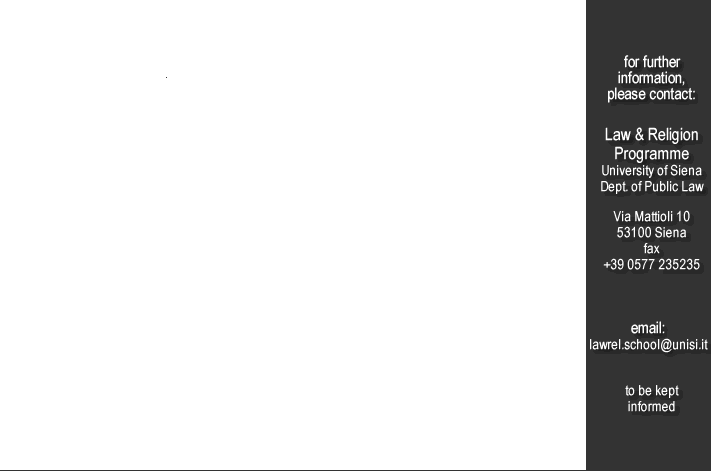


PRESENTATION
The overall purpose of the course is to engage students with
law and religion in an international and multicultural context. Challenging
the limits of a law and religion approach based on a mono national and/or
religious basis, the School is an open and free space where students and teachers
with various backgrounds (as a matter of geography, knowledge, ideas) can
meet and dialogue, discover differences and look for a common language.
The legal approach to religion will be as open minded and independent as possible.
International law and public and private law, but also theological, social
and political sciences will be taken into account. As for the subjects, both
religious legal systems (e.g. Islamic law, Jewish law, canon law) and legal
treatment of religious issues (e.g. religious freedom, legal status of religious
groups, new religious movements, islam in western countries) will be included.
The Summer School will address both the substantive and the methodological
aspect in order to foster a critical understanding of law and religion. Each
Summer School will be devoted to a selected theme. The substantive theme will
be used also to discuss in a concrete way the methodological problems of international
and comparative law and religion.
During one week in August at the College S. Chiara (Siena, Italy) the Summer
School will enable participants to have a direct contact in a very interactive
context with some of the leading specialists in the field (from all over the
world). Classes will not be simply a matter of a teacher reading out a lecture:
he or she will encourage students to contribute ideas, to learn from one another
and to participate in discussion. The variety of working formulae adopted
(lectures, seminar discussions, student presentations, panel sessions, informal
talks) will enhance active participation.
Exposition to an international milieu will be an obvious bonus for the participants.
The School believes that intense interactions among young researchers coming
from different countries and working in the same field is the first step in
the building of cross-national research networks that will continue their
co-operation after the end of the Summer School. The participants will be
able not only to increase their knowledge of the topics treated in the Summer
School but also to submit to public discussion (both by more senior scholars
and by their peers) the research work they are already engaged in or the concrete
issues they are facing as private or public professionals in the field.
 |
|||
 |
|||
 |
|||